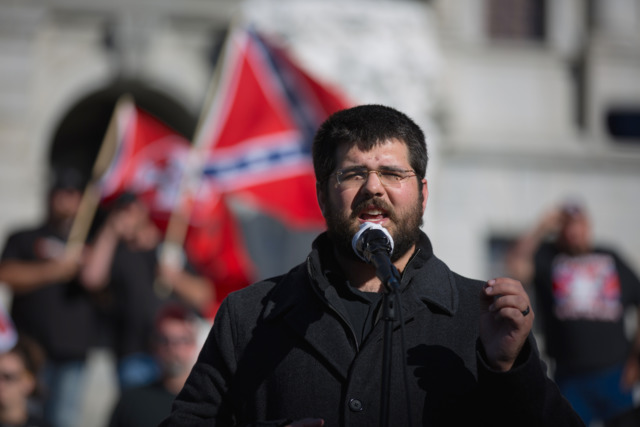
The number of hate groups in many parts of the region is rising, according to a prominent civil rights organization.
The Southern Poverty Law Center this week released its annual "Year in Hate" report, which details the groups it tracked in 2018. That report shows a spike in the number of groups in Ohio and Kentucky, though Indiana saw a decline.
In Ohio, SPLC tracked 36 organizations it says are hate groups in 2018 — up from 31 in 2017 and 35 in 2016. That's the highest number of groups since 2012, the only other year to have seen so many since 2000. SPLC defines a hate group as any group whose ideology denigrates a group of people based on characteristics like skin color, religious beliefs, sexual orientation or ethnic identity. White nationalist, anti-LGBTQ, black separatist, ant-Semitic, anti-Muslim and religious fundamentalist groups are all represented in Ohio. Local groups SPLC has identified as hate groups include West Chester Township radical traditionalist Catholic group Christ or Chaos, Cincinnati-based Act for America, which SPLC says is anti-Muslim, and Cincinnati-based black separatist group Israelite School of Universal Practical Knowledge.
SPLC also tracked more organizations it considers hate groups in Kentucky last year, identifying 13 — an increase from 11 in 2017. Those groups included Union, Kentucky's Fellowship of God's Covenant People, which SPLC says believes whites are favored by God; a chapter of the alt-right group Proud Boys in Louisville; and a Nation of Islam chapter there as well.
The number of groups the SPLC tracked in Indiana dropped last year, going from 30 to 24. Those groups included a chapter of the Ku Klux Klan in Madison and a group called Exodus/Americanus in Floyd's Knob that SPLC says espouses white nationalist beliefs.
The drop in the number of groups in Indiana illustrates how mercurial they can be. In 2017, for example, SPLC listed the Traditionalist Youth Network, a white nationalist group in Paoli, Indiana whose founder Matthew Heimbach has ties to Greater Cincinnati. Heimbach and his Traditionalist Youth Network/Traditionalist Worker Party, founded in 2013, had grown to become a visible force within the white nationalist movement as little as two years ago. However, dramatic infighting last year caused the group to dissolve.
Overall, however, the number of hate groups nationwide is on the rise, according to the SPLC. The organization counted 1,020 in 2018 — an increase from the 954 groups the year prior, an all-time high for the SPLC, and a 30 percent increase over the past four years. White nationalist groups alone rose from 100 chapters to almost 150 across the country, while black separatist groups also increased.
The SPLC's designations can be controversial. This year, the Center for Immigration Studies and Proud Boys founder Gavin McInnes filed lawsuits against the organization, saying that their inclusion on the SPLC's lists is defamatory. Last year, the group paid a British activist named Maajid Nawaz a $3.4 million settlement to end a lawsuit after the group called Nawaz an "anti-Muslim extremist."
SPLC has generally defended its designations, saying those who wind up on its lists are extremists.
The perpetrators of violent, sometimes deadly acts sometimes share the ideologies of the groups SPLC highlights, the organization points out, highlighting the multiple such incidents involving white supremacists that occurred last year alone.
One attack suspected of being tied to white supremacist beliefs happened in October, when a white gunman killed two black shoppers at a Kroger in Jeffersontown, Kentucky.
That shooting was “racism in action,” the town’s police chief told a congregation of the church that the suspected gunman had tried to enter just before the killings. Security footage shows Gregory Bush attempting to get into the predominantly-black First Baptist Church of Jeffersontown, just outside of Louisville, moments before he arrived at the Kroger and shot a man in the back of the head in the store and a woman in the parking lot. Bush, who may have a history of mental illness, reportedly told a bystander that he wouldn’t shoot him because “whites don’t shoot whites” before he got in a vehicle and left. The incident was just one of a number of deadly, racial or ethnically-motivated attacks across the country.





